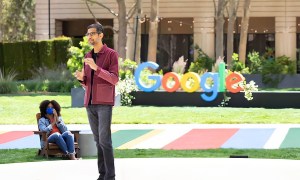
Launching Android app support on Chrome OS was just the first step of Google’s attack on traditional desktop operating systems like Windows 10 and MacOS. At I/O this year, Google announced support for desktop-native features, turning Chromebooks into more powerful productivity machines. These features allow Chrome OS to feel just as natural as a traditional laptop or in newer touch-centric tablet form factors.
Google announced an improved tablet mode, where apps can launch in full-screen mode. Google also announced a new split-screen view, which places two apps side-by-side, a feature similar to Windows 10’s snap feature or the new side-by-side multitasking on Android. Apps can also be dynamically resized to display more data without a restart. If an app launches in a standard portrait-oriented smartphone window, you can see more information displayed as you stretch the app’s window, Google demonstrated in a talk at I/O.
For those who multitask, there’s a new picture-in-picture mode. On the touchscreen, copying and pasting has been reimagined, allowing you to drag text, images, and rich content from one app and drop it into another. This makes Chrome OS feel more like a tablet-first device, similar to how Apple implemented drag-and-drop sharing on the iPad Pro.
Google is also supporting the Android keyboard in Chrome, making it easy to use emoji. App shortcuts will also come to Chrome OS. Rick-clicking or long-pressing an app will show app actions. This allows you to launch a specific command within an app without having to first launch the app, similar to how long-pressing the Gmail app on Android gives you the option to jump directly into the compose window.

Chrome OS will also support pro audio, which means that you could soon see your favorite DJ use a Pixelbook to spin the hottest mixes. MIDI support is present today, and Google announced support for multi-channel USB audio, AAudio, and AAudio MMAP is coming this fall with the M69 release.
Support for multiple displays has also been improved, and more capable hardware like the Pixelbook can connect to a maximum of seven displays simultaneously, Google said. For users who prefer to write or draw, Google has reworked the software to significantly reduce latency. By removing the compositing time and adding a prediction logic, Google claims that the traditional 100ms delay has been reduced to nearly zero.

Chromebooks already outsell all other devices combined in the education space and accounts for 17 percent of all notebooks sold in the US, Google said. The addition of these powerful features to Chrome OS will likely help Google take market share from its rivals.

